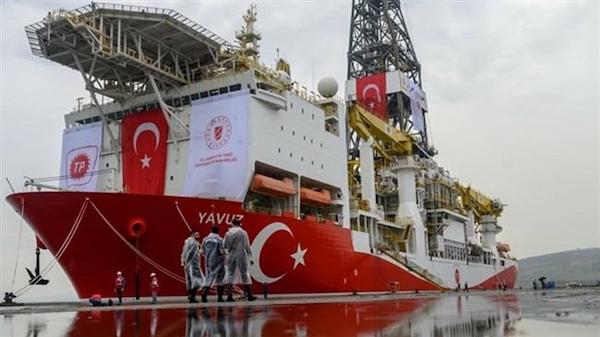
In this file photo, taken on June 20, 2019, Turkish police officers are seen patrolling next to the drilling ship Yavuz, scheduled to search for oil and gas off Cyprus, at the port of Dilovasi, outside Istanbul, Turkey. (By AFP)
Germany says Turkeyís failure to halt drilling activities in contested waters in the eastern Mediterranean Sea would affect relations between Ankara and the European Union (EU).
German Foreign Minister Heiko Maas raised the alarm on Tuesday, after his Turkish counterpart, Mevlut Cavusoglu, said last week that Ankara would start seismic research and gas drilling operations in waters that are covered by an agreement between Turkey and the Libyan government.
Greece has rejected the accord as geographically absurd since it ignores the presence of the Greek island of Crete between the coasts of Turkey and Libya.
Maas said the activities constituted acts of "provocation."
"Regarding Turkeyís drilling in the eastern Mediterranean, we have a very clear position; international law must be upheld and that is why progress in EU-Turkey relations will only be possible if Ankara stops provocations in the eastern Mediterranean," the German foreign minister said during a visit to the Greek capital of Athens on Tuesday.
"At the same time, we see the need within the European Union for dialog with Turkey given that Turkey is an important strategic partner when it comes to NATO and migration policies. That is why there canít be any honest dialog with Turkey if we canít tell Turkey they have to deliver when it comes [to] all the unanswered questions especially concerning the eastern Mediterranean," he said.
Turkeyís claims to drilling rights have also upset other countries around the corner of the sea, namely Egypt and Cyprus.
The drilling has also led to a stalemate in negotiations over Turkeyís accession to the EU. Earlier this year, the EU announced plans to slap sanctions on Ankara over its "illegal" drilling in the eastern Mediterranean off Cyprus.
The Cypriot government has previously called Turkey a "pirate state" because of Ankaraís resumption of drilling operations in waters that Cyprus claims to be part of its exclusive economic zone (EEZ).
Turkey rejects the agreements that the internationally-recognized Cypriot government has reached with other Mediterranean states on maritime economic zones.
Cyprus was divided in 1974 after a Turkish invasion triggered by a brief, Greek-inspired coup. Several peacemaking efforts have failed, and the discovery of offshore resources in the eastern Mediterranean has complicated the negotiations.
SOURCE: PRESS TV
LINK: https://www.ansarpress.com/english/19500
TAGS:






























 online news tv
online news tv




